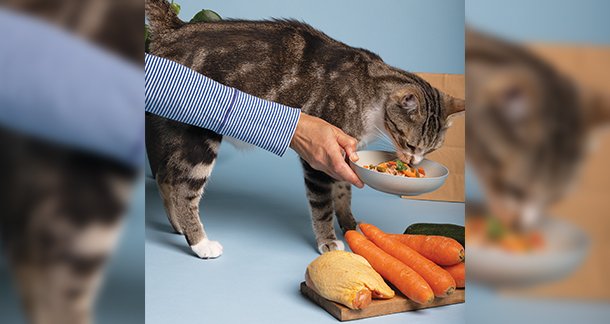Winter season, can pose unique challenges for our furry companions. As temperature dips, it is crucial to adjust their diet and care routine to ensure they stay warm, healthy, and energetic.
Understanding the Challenges of Winter
- Increased Energy Expenditure: Both dogs and cats may burn more energyto maintain their body temperature, especially during cold nights.
- Reduced Appetite: Some pets may experience a decrease in appetite due to colder weather.
- Immunity Boost: A balanced diet can help strengthen their immune system, protecting them from seasonal illnesses.

Essential Nutritional Considerations For Dogs and Cats:
- Protein:Crucial for muscle mass, tissue repair, and immune Sources include lean meats, fish, eggs, and high-quality dog / cat food (as per the Association of American Feed Control Officials (AAFCO) guidelines).
- Healthy Fats: Provide warmth, insulation, and support brain health. Sources include fish oil, flaxseed oil, coconut oil, and fatty cuts of meat.
- Carbohydrates: A source of energy, though less important for cats than dogs. Sources include brown rice, sweet potatoes, and grains included in high-quality pet food.
- Vitamins and Minerals: Essential for overall health, immunity, and bone health. Sources include high-quality pet food, and supplements (if recommended by a vet).
Diet Adjustments for Winter
- Increase Caloric Intake: Consider increasing their food intake to compensate for the extra energy they burn.
- Warm Meals: Warm, cooked food can be more appealing, especially for older
- Hydration: pets reduce water intake during winter . Ensure they have access to fresh, warm water.
- Avoid Overfeeding: While increasing their caloric intake is important, avoid overfeeding, as it can lead to obesity and other health issues.
- Consult Your Vet: Before making significant dietary changes, always consult your veterinarian to get personalized advice for your pet’s specific needs.

For Puppies and Kittens:
- FrequentMeals: Smaller, more frequent meals to maintain energy
- High-QualityFood: Provides essential nutrients for growth and
- Warmth:Ensure they have a warm, draft-free place to
For Senior Dogs and Cats:
- GentleDigestion: Opt for easily digestible foods to avoid digestive
- Joint Health: Consider supplements like glucosamine and chondroitin to support joint health.
- Warmth:Provide extra warmth and Give them orthopaedic beds
Additional Winter Care Tips
- Regular Grooming: Brushing your pet regularly can help remove excess hair and prevent matting.
- Paw Protection: Consider using paw wax and booties if you live in areas that have snowto protect their paws.
- IndoorExercise: Provide indoor toys and activities to keep them
- WarmBedding: Ensure they have a cozy, warm bed to sleep
- Veterinary Check-ups: Schedule regular veterinary check-ups to monitor their health.
- For Street Animals: Provide shelter, warm bedding, and food, especially during severe weather.
By following these suggestions and seeking advice from your veterinarian, you can ensure that your fur buddies stays healthy, happy, and well-nourished throughout the winter season.

About the Author
Dr.Vinay Chabbra
Veterinarian and Founder Myfurries.com

